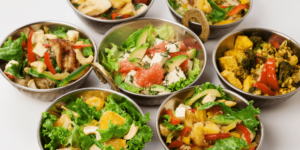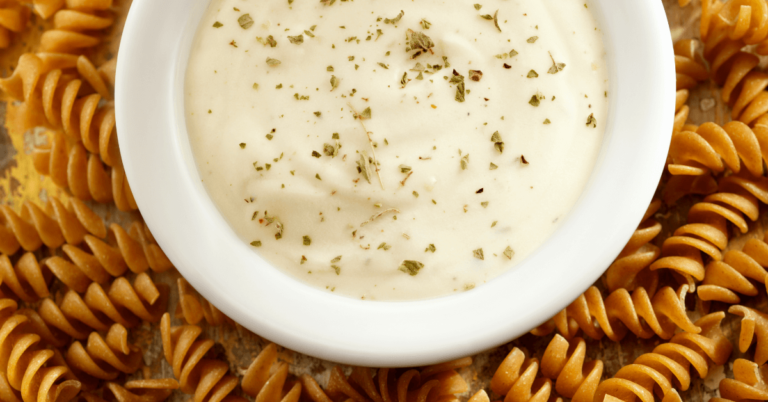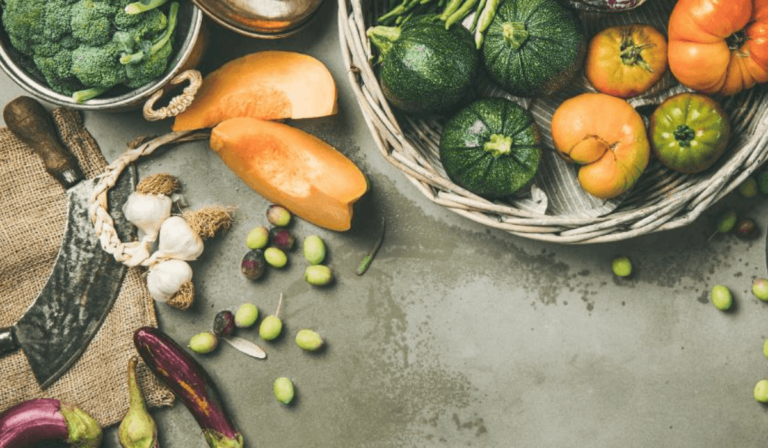Introduction to Vegetarian Cuisine
Defining Vegetarian Cuisine
What’s vegetarian cuisine? It’s all about plant-based foods, minus the meat. Imagine lots of vegetables, grains, nuts, seeds, and beans. It’s not limited to salads; it spans a wide range of yummy dishes. Vegetarian meals can be simple, like a veggie stir-fry, or fancy, like a gourmet eggplant lasagna.
There are different types of vegetarian diets. Some include dairy and eggs, while others don’t. What’s common in all? No meat, chicken, or fish. Vegetarian food is a celebration of plants in all their glory.
Importance of Vegetarian Cuisine in Modern Diet
Why are more people going vegetarian? It’s not just a passing trend. It’s a change in how we eat for better health and a better planet.
Firstly, it’s good for you! Vegetarian diets are full of nutrients and low in bad fats. They’re great for your heart and weight. They also have lots of fiber, which keeps your stomach happy.
But it’s not just about you. Going vegetarian helps the planet too. It means less harm to the environment. It helps reduce pollution and saves water and land.
In short, vegetarian cuisine is good for your health and the Earth. Whether you’re a lifelong vegetarian or just curious, trying vegetarian food can be both tasty and meaningful. Stick around as we explore more about vegetarian eating!
Historical Roots of Vegetarian Cuisine
Ancient Practices
Vegetarian eating goes way back in time. Ancient people like the Greeks, Indians, and Egyptians chose plants over meat for health and beliefs. It was more than food for them; it was part of their culture and way of life.
In ancient India, for example, being vegetarian was about kindness and respecting life, a big part of Hinduism and Buddhism. In Greece, thinkers like Pythagoras said no to meat for both ethical and health reasons.
Evolution Over Centuries
Vegetarian food has changed a lot over time. Each period in history added something new to this food style. During medieval times, going meatless was often about religion and simplicity. In the Renaissance, people started to enjoy the real tastes of veggies and herbs more.
In the 19th and 20th centuries, things shifted. People chose vegetarian food not just for religion or ethics but also for their health and the environment. New cooking ways and exciting veggies and spices from around the world made vegetarian meals even tastier.
Nowadays, vegetarian eating is super popular worldwide. It mixes old wisdom with new kitchen tricks. The story of vegetarian food shows how it stays popular and keeps changing over time. Keep reading as we explore more about this interesting way of eating!
Global Influence on Vegetarian Cuisine
Indian Vegetarian Cuisine
Indian cuisine is a vegetarian’s paradise! It’s famous for its creative use of veggies, lentils, and spices. Think about dishes like palak paneer (spinach with cheese) or chana masala (spicy chickpeas). Indian meals often use rice or bread like naan and roti. The best part? Indian vegetarian food is full of flavor – from mild to super spicy.
Spices are the stars in Indian cooking. They make each dish unique. Plus, India’s many regions have their own special vegetarian recipes. From North to South, East to West, there’s always something new and delicious to try.
Mediterranean Vegetarian Delicacies
Now, let’s sail to the Mediterranean. Here, vegetarian food is all about fresh ingredients. Think olives, tomatoes, cucumbers, and lots of olive oil. Dishes like Greek salad, hummus, and falafel are popular. They’re not just tasty but also healthy.
Mediterranean cooking uses herbs like oregano, basil, and thyme to add fresh, aromatic flavors. The food here is often light and refreshing, perfect for a sunny day.
East Asian Vegetarian Traditions
Heading over to East Asia, vegetarian cooking is a blend of tradition and innovation. Countries like China, Japan, and Korea have unique vegetarian dishes. Tofu is a big deal here. It’s used in many ways, from stir-fries to soups.
East Asian vegetarian food is also about balance. It’s not just about taste; it’s about colors and textures too. Vegetables, rice, and noodles are main ingredients. Soy sauce, ginger, and garlic add that special touch to the dishes.
In these three regions, vegetarian cuisine is a world of its own. Each has its unique flavors and ingredients, showing how diverse and exciting vegetarian food can be. Stick around as we continue to explore the colorful world of vegetarian cuisine!
Health Benefits of Vegetarian Cuisine
Nutritional Value
Vegetarian food isn’t just tasty; it’s packed with good stuff for your body! Plant-based diets are rich in vitamins, minerals, and fiber. You get a lot of nutrients from fruits, veggies, beans, and grains. These foods are heroes for your health.
Veggies and fruits are full of vitamins like A, C, and E, and minerals like potassium. Beans and lentils? They’re a great source of protein and fiber. Whole grains give you energy and keep your stomach happy. Plus, vegetarian food is usually low in bad fats and calories. This means it’s good for your heart and weight.
Impact on Longevity and Wellness
Eating vegetarian can help you live a healthier life for longer. Studies show that people who eat more plants tend to have a lower risk of diseases. We’re talking about fewer heart problems, less type 2 diabetes, and lower chances of some cancers.
It’s not just about living longer; it’s about living better. A vegetarian diet can boost your mood and energy levels. It can also help you keep a healthy weight. Plus, lots of plants in your diet mean a happier digestive system.
In short, going vegetarian can be a big win for your health. It’s about getting all the nutrients you need while reducing risks of diseases. Plus, it’s a tasty way to take care of yourself! Stay tuned as we explore more about the goodness of vegetarian cuisine!
Popular Vegetarian Dishes Around the World
Indian: Paneer Tikka and Samosas
Let’s start our global food tour in India with paneer tikka and samosas. Paneer tikka is a mouth-watering dish made with chunks of paneer (Indian cottage cheese) marinated in spices and grilled. It’s usually served with mint chutney and is a favorite at parties.
Samosas are a popular snack. These are crispy pastries filled with spicy potatoes, peas, and sometimes lentils. They’re perfect with a cup of chai and are loved by people of all ages.
Mediterranean: Falafel and Hummus
Next stop: the Mediterranean for falafel and hummus. Falafel are deep-fried balls made from ground chickpeas or fava beans, mixed with herbs and spices. They’re often served in pita bread with salad and tahini sauce.
Hummus is a creamy spread made from mashed chickpeas, blended with tahini, olive oil, lemon juice, and garlic. It’s a staple in many Mediterranean diets and is great with bread or as a dip for veggies.
East Asian: Tofu Stir-fry and Vegetable Sushi
Heading over to East Asia, we’ve got tofu stir-fry and vegetable sushi. Tofu stir-fry is a simple yet delicious dish. It’s made with tofu cooked with a mix of colorful veggies and a savory sauce. It’s a go-to meal for a quick, nutritious dinner.
Vegetable sushi is a fun and healthy choice. It’s made with sushi rice and fresh veggies like cucumber, avocado, and carrot, all rolled up in seaweed. It’s often served with soy sauce, wasabi, and pickled ginger.
These dishes from India, the Mediterranean, and East Asia show how diverse and delicious vegetarian food can be. Each dish is unique, full of flavor, and a joy to eat. Keep reading to discover more vegetarian delights from around the world!
Innovations in Vegetarian Cooking
Fusion Dishes
Vegetarian cooking is getting really creative with fusion dishes. Chefs are mixing flavors from different places to make awesome new meals. Think of things like Thai curry pizza or Mexican-style quinoa salad. It’s all about mixing different food styles to create something exciting and new.
Fusion is about being creative. It’s taking classic dishes and adding a twist. Like using tofu in Italian pasta or Indian spices in an American veggie burger. There’s no end to the tasty combinations you can try!
Modern Cooking Techniques
Now, let’s talk about cool new ways to cook vegetarian food. Chefs and home cooks are trying things like sous-vide and air frying to make veggies and plant-based foods even better. These ways of cooking keep the good stuff in the food and make it taste great.
Sous-vide cooks food slowly in a sealed bag in water. It makes veggies really soft and full of flavor. Air frying is another neat trick. It makes food crispy like it’s fried, but with less oil. It’s a healthier way to enjoy crunchy snacks.
With these new ideas and ways of cooking, vegetarian food is more fun and varied than ever. Whether you’ve been eating vegetarian for a long time or are just starting, there’s always something new and exciting to try. Keep an eye out for more cool vegetarian cooking tips!
Vegetarian Cuisine in Fine Dining
Notable Vegetarian Restaurants
Vegetarian food is a big hit in fancy restaurants. There are some really cool vegetarian places out there. They make dishes that are not only healthy but also look and taste amazing. They use fresh and top-notch ingredients to create meals that are like art on a plate.
All over the world, in big cities, you can find famous vegetarian restaurants. They have everything from fancy veggie burgers to big, fancy meals. These restaurants show that vegetarian food can be special and really filling.
Award-Winning Vegetarian Chefs
Now, let’s talk about the chefs. These award-winning chefs are making vegetarian food that’s super creative and yummy. They’re not just cooks; they’re like artists and inventors in the kitchen.
These chefs have gotten awards and lots of praise for their cooking. They’re changing how people see vegetarian food. It’s not just an alternative choice; it’s its own kind of great food in fancy dining.
Vegetarian food has really made its mark in fancy restaurants. Thanks to these awesome chefs and their restaurants, vegetarian meals are now seen as something special, not just a side option. Stay tuned for more on the exciting world of fine dining with vegetarian foo
Home Cooking: Easy Vegetarian Recipes
Simple and Nutritious Meals
Cooking vegetarian at home? It’s easier than you think! There are lots of simple, nutritious recipes that are perfect for everyday meals. Imagine dishes like a quick veggie stir-fry, a hearty lentil soup, or a fresh tomato and cucumber salad. These meals are not only easy to make but also good for you.
Vegetarian cooking at home means you can use whole, fresh ingredients. You’re in control of what goes into your food, so it’s healthier. Plus, these meals are often quick to prepare. Perfect for busy days!
Cooking Tips for Beginners
If you’re new to vegetarian cooking, don’t worry! Here are some tips to help you get started:
- Start Simple: Pick recipes with a few ingredients and easy steps. Dishes like pasta with tomato sauce or a basic vegetable curry are great to begin with.
- Use Fresh Produce: Fresh veggies and fruits add flavor and nutrition to your meals.
- Experiment with Spices: Spices can turn a simple dish into something special. Don’t be afraid to try new combinations.
- Keep It Balanced: Include a variety of foods in your meals – veggies, grains, and protein sources like beans or tofu.
- Have Fun: Cooking should be enjoyable. Play with different ingredients and find what you love.
Home cooking vegetarian meals is a fun and healthy journey. With these simple recipes and tips, you’ll be whipping up delicious dishes in no time. Stay tuned for more easy and tasty vegetarian cooking ideas!

Vegetarian Cuisine for Special Diets
Gluten-Free Options
Vegetarian food is great for gluten-free diets. Lots of plant-based foods don’t have gluten. Think fruits, veggies, beans, and grains like rice and quinoa. You can make yummy gluten-free meals with these.
You can also find gluten-free pasta and bread. So, you can still enjoy your favorite meals, just without gluten. It’s all about choosing the right ingredients and being a bit creative when you cook.
Low-Calorie Vegetarian Meals
If you’re looking for low-calorie vegetarian meals, you’ve got plenty of options. Vegetarian food can help you watch your calories. Veggies and fruits are low in calories but full of good stuff. You can make dishes like veggie soups, salads, and stir-fries that are tasty and not too heavy.
The trick is to use less oil and add flavor with herbs and spices. Also, pick whole grains and proteins like lentils and tofu. These foods fill you up without too many calories.
Vegetarian cuisine is really good for special diets, like gluten-free or low-calorie. With the right foods and recipes, you can make meals that are healthy, delicious, and fit your diet needs. Stay tuned for more tips on vegetarian cooking for special diets!
The Environmental Impact of Vegetarian Cuisine
Sustainable Agriculture
Vegetarian cuisine is not just good for you; it’s also kinder to the planet. It’s closely linked to sustainable agriculture. This means growing food in ways that are good for the earth. When we choose vegetarian foods, we often support farming that uses less water, less land, and fewer chemicals.
Sustainable agriculture also helps wildlife. It means fewer pesticides, which is better for bees and other important insects. Plus, it can help keep the soil healthy. Healthy soil grows healthy plants, and that’s good for everyone.
Reducing Carbon Footprint
Eating vegetarian can help reduce your carbon footprint. What’s a carbon footprint? It’s like a mark we leave on the planet, based on how much carbon dioxide we produce. Meat production creates a lot of carbon dioxide, which is bad for the climate.
When you eat more plants and less meat, you help cut down on these emissions. It’s a simple change, but it can make a big difference. By eating vegetarian, you’re doing your part to fight climate change.
The Future of Vegetarian Cuisine
Trends in Plant-based Eating
Vegetarian eating is not just a phase – it’s here to stay and it’s evolving. One big trend is plant-based meats. These are foods made to taste like meat but are 100% plant-based. Think burgers that sizzle and taste like beef but are made from plants. They’re getting more popular and are a great option for people who want to eat less meat but still enjoy similar flavors.
Another trend is the focus on whole, unprocessed foods. More people are choosing foods that are as close to their natural state as possible. This means lots of fresh fruits, veggies, grains, and nuts. It’s all about eating clean and healthy.
Innovations and Predictions
The future of vegetarian cuisine is also full of exciting innovations. One area is lab-grown foods. Scientists are working on growing meat in labs, without the need for farming animals. It’s still early days, but this could be a big thing in the future.
Another prediction is that vegetarian eating will become more mainstream. As more people understand the health and environmental benefits, vegetarian options will become a regular part of menus everywhere, from fast food to fine dining.
Vegetarian cuisine is moving in exciting directions. With new trends and innovations, it’s becoming more accessible and appealing to everyone. The future looks tasty for plant-based eating! Keep up with us for more insights into the world of vegetarian cuisine.
FAQs
FAQs ABOUT What Is the Best Vegetarian Cuisine
Have questions about the best vegetarian cuisine? You’re not alone! Here are some common FAQs to help you on your vegetarian journey:
Q: What is the best vegetarian cuisine?
A: The best vegetarian cuisine is subjective and varies from person to person. It depends on your taste preferences. Some popular options include Indian, Mediterranean, and East Asian cuisines.
Q: Is vegetarian food healthy?
A: Yes, vegetarian food can be very healthy. It’s often rich in vitamins, minerals, and fiber. It can help reduce the risk of certain diseases and support a balanced diet.
Q: Can I get enough protein on a vegetarian diet?
A: Absolutely! There are plenty of plant-based sources of protein, such as beans, lentils, tofu, and nuts. You can meet your protein needs with a well-balanced vegetarian diet.
Q: What are some easy vegetarian recipes for beginners?
A: For beginners, simple recipes like pasta with tomato sauce, vegetable stir-fries, or basic salads are great options. They’re easy to make and delicious.
Q: How can I make vegetarian meals more flavorful?
A: Spices and herbs are your best friends! Experiment with different seasonings to add flavor to your dishes. Also, don’t be afraid to use ingredients like garlic, ginger, and soy sauce for extra taste.
Q: Is vegetarian cuisine environmentally friendly?
A: Yes, vegetarian cuisine is often more environmentally friendly than diets heavy in meat. It can help reduce greenhouse gas emissions and promote sustainable farming practices.
These FAQs should provide some answers to common questions about vegetarian cuisine. If you have more questions or want to explore further, keep reading and discovering the world of delicious and nutritious vegetarian food!






